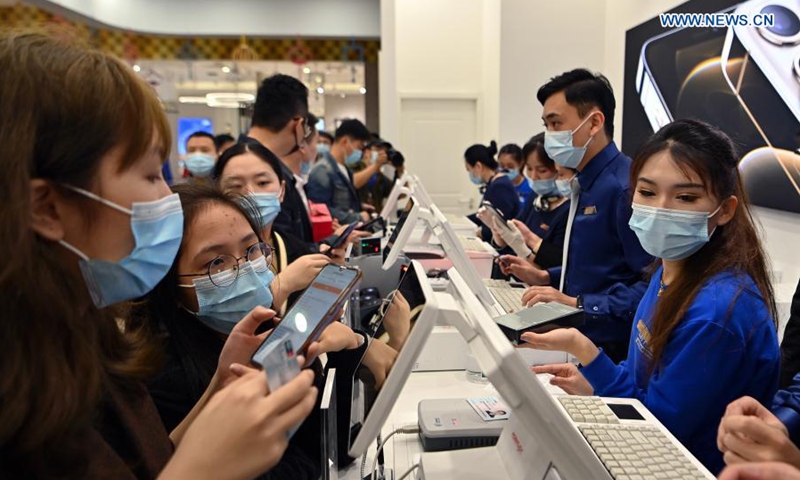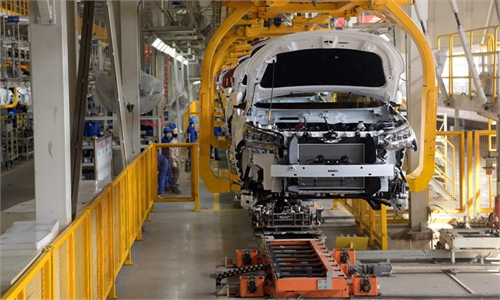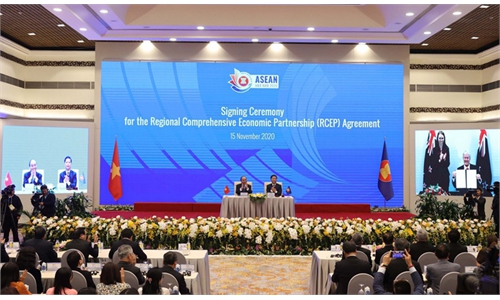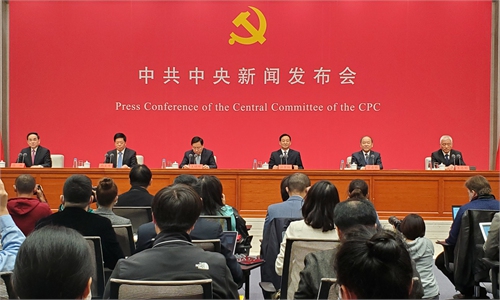
Customers visit Global Premium Duty Free Plaza in Haikou, south China's Hainan Province, Jan. 31, 2021. Two new offshore duty-free shops opened on Sunday in Haikou, capital of south China's island province of Hainan, raising the number of duty-free shops in the province to nine. (Xinhua/Guo Cheng)
The first International Consumer Products Expo will be held from May 7-10 in South China's Hainan Province, with about 630 foreign companies from 69 countries and regions participating, a move that analysts said highlights the country's further opening-up despite tense relations with the US and some of its allies.
The expo is expected to be the Asia-Pacific region's largest boutique exhibition, with an area of 80,000 square meters, Shen Danyang, vice governor of Hainan, said at a press briefing at the State Council Information Office in Beijing on Wednesday.
The area for international pavilions will reach 60,000 square meters, divided into five zones: fashion, jewelry and diamonds, high-end food and health products, travel, and integrated services.
Switzerland will be the guest country of honor. About 1,165 foreign brands will participate, including French companies L'Oreal Group and Galeries Lafayette, British companies Burberry and Jaguar Land Rover, as well as US-based Tesla, Dell, and Johnson & Johnson.
Overseas products within a certain value will be entitled to duty-free import and sales policies, and purchases at the expo won't be included in Chinese consumers' 100,000 yuan ($1,533) duty-free shopping quota in Hainan, according to Chinese officials.
"Foreign companies account for the majority of the expo's participants, which not only demonstrates China's firm resolve in pushing forward high-level opening-up but also shows that foreign investors remain bullish on the Chinese market and economy," Vice Minister of Commerce Wang Bingnan said at the press briefing on Wednesday.
The trade expo comes at a time when China's relations with the EU are impacted, after the latter imposed unilateral sanctions on four Chinese individuals and one entity, making groundless human rights attacks on China. In response, China on Monday sanctioned 10 individuals and four entities in EU that severely harm China's sovereignty and interests, and maliciously spread lies and disinformation.
Beijing's relations with Washington, which soured under former US president Donald Trump's administration, have seen no sign of a reset in the first weeks of the Biden era.
"China's tempo in opening-up won't be rolled back, regardless of how the external environment and political relations with other major economies evolve," Hu Qimu, chief researcher at the Sinosteel Economic Research Institute, told the Global Times on Wednesday.
He said that China's "dual-circulation" strategy underscores how the country's internal consumer market could cushion it against external uncertainty, and how China is willing to share its development dividends with the world.
China - which is home to 1.4 billion people and about 500 million middle-class residents — is the world's most promising consumer market, and such a market will provide more opportunities for international cooperation and contribute to the world's economic recovery and growth, according to Wang.
Cui Hongjian, director of the Department of European Studies at the China Institute of International Studies, told the Global Times on Wednesday that although political divisions between China and the West are widening, it is unlikely that companies from the US and EU would abandon their interests in the Chinese market.
"It may become the new normal: China and major Western economies 'quarrel' over political issues but bilateral economic cooperation still gains steam as their economies rely heavily on each other. Such economic ties in turn will weigh on political decisions," Cui said.
Against this backdrop, observers stressed that from a long-term perspective, it is important that China continues to open up and attract more foreign capital, so as to consolidate and expand its influence on the world economy.
A spokesperson of the European Union Chamber of Commerce in China told the Global Times in an interview that European companies are keen on investing in China in sectors including chemicals, machinery and consumer goods.
Jiang Wei, president of Germany-based pharmaceutical company Bayer Group Greater China, told the Global Times that in 2021, the company will continue to tap into the China market's potential and launch innovative drugs and health products in China, covering prostate cancer treatment, immunity management, digestive health, skin management and other fields.



